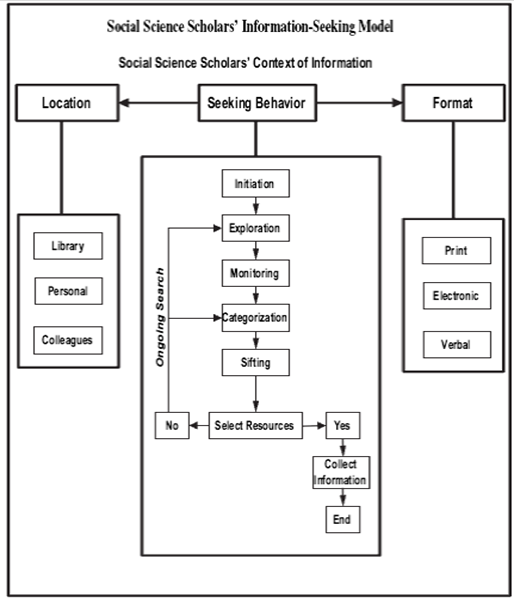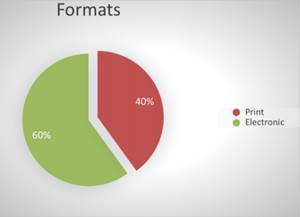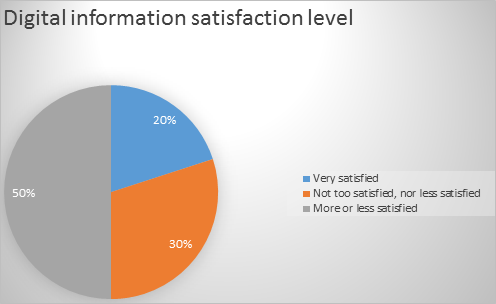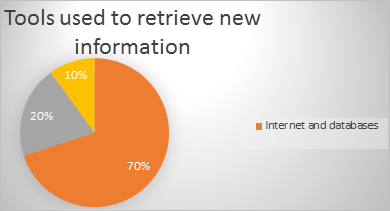1. Background
Studies on information seeking behavior were often based on retrieval systems and their interaction with patrons at their beginnings. By the eighties, approaches changed in the conceptualization and design of research towards more user-oriented (Dervin & Nilan, 1986).
There is abundant literature on information behavior for researchers and scholars. The most common way to investigate the information-seeking behavior is by the use of surveys, interviews and focus groups. (Haglund & Olsson, 2008). More recent studies of information behavior focus on occupations, roles and demographic groups, specifically groups of health sciences (Case, 2007).
Other issues that change scholars’ information behavior are:
1. Proximity, which it is related to how close scholars are from their information sources (Hiltz & Johnson, 1989) It will be more likely for scholars to get a book from their personal library shelves, where they know the information is, rather than surf the web.
2. Serendipity is another issue regarding information behavior (Olsen, 1994) where 82% of scholars consider serendipity as a key factor involved in information and retrieval processes.
3. Validity: accuracy of information provided, authority, trustworthiness of sources, verifiability (Saracevic, 2007).
4. Convenience is related with the facility, intuitiveness and user-friendly information can be presented to patrons (Connaway, Dickey & Radford, 2011). It is easy to continue using resources used successfully in the past rather than newer and complex ones. This assumption can explain why young students prefer Google over other information retrieval systems, perhaps they feel more comfortable using web browsers and search engines rather than OPACs.
5. Confidence, fear and insecurity towards technology can affect information behavior, where past experiences can play an important role to select sources. Those who have had hard times using certain tools, are less likely to use them again (McCreadie & Rice, 1999). This reason can explain why scholars tend to look for reliable and known sources from the past or why they can prefer print instead of digital information.
All the above issues can change and shape information behavior in scholars, a diverse group, with different discourses and approach to research, where needs may diverge from field to field, culture, expertise academic background (Aukland, 2012).
Likewise, researchers today and thanks to technology, have a broad range of resources saand less limitations to access worldwide content and information (Stickley, 2010) which can turn in a vast amount of information, difficult to find, sort and evaluate.
In general, scholars want to identify, sort and select relevant resources more efficiently and their methods to discover new information resources can differ, but literature suggests many of them highly rely on search engines, specifically Google, and its Scholar as a main source to retrieve information (Research Information Network and the Consortium of University Research Libraries, 2007), because it is easy, simple and its interface is very intuitive and bring results immediately.
It can be seen a model on information seeking for social science scholars proposed by Al-Suqri in the Graph 1, where he shows scholars’ seeking behavior and preferred formats. As he suggests, print is scholars’ first option and they tend to use more libraries to find information.
However, technologies have dramatically impacted information behavior patterns, as scholars are shifting to electronic resources more frequently. Therefore, models need to be revised and adapt to a new digital era (Al-Suqri, 2015).
• Information Behavior in Political Studies Researchers
There is little evidence from studies on the information behavior of researchers in the field of political studies. Most of these studies are related to law, but they have focused, in most cases, to analyze the behavior of lawyers in order to improve search and retrieval systems and developing new information systems towards more effective searches.
Within these studies is (Otike, 1999) in which he summarizes the major work done on the information needs of lawyers in England and their information browsing habits. The findings of this research showed that the information needs of lawyers are strongly influenced by the nature of their work, where experience is invaluable and influence in their needs, depending largely from printed sources and electronic resources were less used.
(Makri, Blandford & Cox, 2008) their study claim that scholars in law used, primarily, a set of electronic resources generally databases such as LexisNexis, the Google search engine and Google Scholar.
Specifically, in the field of political studies, there is an antique research conducted by (Straw, 1993) to historians and scholars of political studies at Kent University, which aimed to develop a profile of these scholars to find the information types used for research in a regular basis. This study found that regardless the similarities and differences between the two disciplines, historians are more conservative, using, mostly, oldest printed resources, while researchers in political studies use most current resources such as CD-ROM and online databases.
There are other related studies on information behavior of students in political studies (Thornton, 2010) showing how unserious and less deep they address information found on the Internet.
2. Method
This research adopts a mixed design in which combines quantitative and qualitative approaches in data collection and analysis techniques, in order to achieve a better approach for the object to study, from different paradigms.
In the quantitative paradigm, this research based its analysis by using descriptive statistics, through the collection, organization, analysis and representation of a data set collected through surveys.Excelwas used to represent and tabulate data. From the qualitative paradigm, interviews were held with researchers of the Institute of Political Studies - IPS, which were categorized and processed in Atlas.ti.
2.1. Sampling
This study focused on professors linked to the research group "Political Studies" of IPS at the University of Antioquia, including 3 women and 7 men, ages ranging between 27 to 54. These researches have been in the University from 3 to 15 years at IPS with master and doctoral education.
These researchers have received, somehow, training from different library systems, whether through courses in information literacy from the library in the University of Antioquia, or from the universities they have received postgraduate studies in electronic resources. However some of the researchers interviewed manifested they have acquired their Internet searching skills by themselves, intuitively and by try and failure. All the researchers agreed they needed more instruction and training dealing with digital information and they felt infoxicated1
2.2. Instrument Design
Open questions were used in order to know researcher experiences and imprints. In the other hand, closed questions were developed in the survey to find categories, based on previous created questions by researchers in order to standardize the participants’ answers.
Qualitative data were collected through semi-structured interviews to all IPS researchers. Data analysis used the triangulation method.
3. Results and Analysis
3.1. Sources Commonly Used by Researchers and Formats Between Analogue and Digital
3.1.1. Databases .
60% of IPS researchers frequently used electronic resources offered by libraries. 30% of researchers said they did not use to often databases. Only 10% said these resources were used very often on a regular basis.
3.1.2. Information formats.
Nowadays the same information can be found in different formats and media, including print and digital. This study found a paradoxical result when asked researchers about the more common used format found for scholar sources. Findings here showed 60% for digital sources against 40% for print.
This argument is according with what (Straw, 1993) found in his study, comparing United States scholars from history and political sciences, where these last ones opted for electronic resources more frequently compared to historians. However, there is no evidence of IPS researcher’s behavior in the late XX century. Thus, it is no possible to contest scholars from developing and developed countries at different periods of time. It might be suggested IPS researchers have shifted their information behaviors lately with internet advent.
When researchers were asked for types of information, all of IPS researchers used e-books, but only 40% of them did not consider them relevant for purchase, while the other 40% have a perception that they are free online in different download sites.
Some reasons for digital choice were online sources were more convenient to carry many books on portable devices and low cost, because they could find many free resources on the internet, and those priced sources sometimes showed cheaper prices versus print content and their availability was immediate.
3.1.3. Satisfaction with digital information .
IPS researchers are quite familiar using Internet as a reference tool for scholar and research activities. The study showed that half of participants were familiar with the information in digital formats. Digital content consumption does not mean researchers read on screen, some of them prefer to print digital content to read later, highlight, make marks and comments, but most of them remarked they did not have any problem reading on screen.
Another reason to read on screen is because all of researchers have to do their scholar activities in computers, so, they have to read a lot on screen.
3.1.4. Tools to store information.
The results show that IPS researchers are still using conventional word-processing tools like Word, and they used Windows folders to store their information. However, it is word mentioning that few researchers have started using cloud storage services.
3.1.5. Search strategies.
The search strategy and retrieval of scientific message is linked to a process of information literacy that determines the effectiveness and efficiency of researchers to retrieve the most relevant resources in the shortest possible time and in an autonomous way.
In this regard, a small group of researchers said they preferred print sources and their personal libraries instead of Internet, because they were afraid of the huge amount of information available in Internet and the lack of rigor and tools for efficient information retrieval relevance, as well as greater familiarity with printed sources, which is how they learned and how they feel more comfortable. This study confirms McCradie' belief of fear and impotence untrained information seekers may feel when they face digital resources (McCreadie & Rice, 1999).
Another reason for the selection of books and personal libraries lies in the ignorance they have related with tools to retrieve the most appropriate online resources and digital content, as this involves a series of skills, techniques and criteria that must be learned and it is not always easy by trial and failure or they do not have enough time to learn.
The last reason for researchers to select their personal libraries to retrieve information is because proximity and convenience (Hiltz & Johnson, 1989; Connaway et al., 2011). They know their books and they are there effortlessly.
3.1.6. Relevance of results in searches.
The relevance and evaluation of the results of the search process can be measured in different ways, depending on the knowledge researchers have about it, but it is certainly an important aspect when selecting sources and resources of quality and reliability for the different activities of teaching and research.
This study found in IPS researchers a strong preference and confidence to select and evaluate the results of searches according with previous information and background knowledge they already had, due to their experience in the field and the various validated and well known sources.
The validity, recognition and prestige of the authors play determinant roles within search selection criteria in IPS researchers, as well as source origins. Within political studies filed is very important to find the most quoted and highest impact and visibility sources.
In this regard, scholars reported they determined the relevance of the results according to the type of authors, their working subjects, profile citation and impact factors of their work and discussions. These findings confirm Saracevic's argument of validity, authority, trustworthiness of sources, verifiability used by IPS researchers (Saracevic, 2007).
3.1.7. Mechanisms for accessing new resources.
Researchers reported they knew new resources thanks to colleagues and co-workers, who played a major role in spreading new and recent scholar content. A database search tendency was evidenced for scholar purposes; because these tools provide the researcher new serial titles when free or keyword searches are queried. Ebsco, Scopus and other open access as SciELO, Scirus and Redalyc were found within these databases, institutional repositories and licensed resources were mentioned by researchers as other tools to find new information sources.
3.1.8. Barriers to access to information.
This study revealed some barriers and obstacles to access information and also showed the degree of researchers in information literacy in its early stages.
• Technology instruction: A small group suggested that, coming from schools and traditional education, with little use of technology, this was one of the impediments to switch from print to digital contents, because this was very time consuming and hazardous endeavor, which involved a lot more work and they had no time, because of demands by the Institute and research itself.
• Another group said they had hard time locating information from gray literature or content that was not officially published as case studies and some published researches.
• Another group reported it was more complicated and difficult to find information on the Internet by using different filters to access this information in comparison with libraries, which seemed more simple and accessible, because their OPACS were more precise, to review the different results obtained from the Internet, along with the various filters to be used to access this information.
3.1.9. Update tools from IPS researchers
Findings evidenced a tendency of researchers to interact with experts and colleagues through face mechanisms, such as face to face encounters, to learn new tools and sources that are currently unknown. An example is the case of the IPS librarian, who was relevant in disseminating information on the researchers face to face.
3.2. Researchers’ Preferences According to the Scholar and Scientific Information Channels
3.2.1. Sources of information.
Overall results indicate that researchers still consider books as the main reference source with 60% of respondents, followed by websites and referee journals when information is not new, but for new information they use electronic 60% over 40% for print.
3.2.2. Most used Internet resources for scholarly activities.
Searching articles through Internet was a trend observed in researches as a preferred option and main way to access information and knowledge. Among their reasons are update and dissemination power.
These articles often come from Internet and library online resources as databases.
4. Recommendations
• IPS library, associated with the library system, should, not only, offer more training to their researchers on digital resources and tips to search more effectively, but to stablish channels and services as content curator to support their faculty by informing them on new digital information resources on a regular basis and make them aware of the importance of tools like social media and scientific communication in a digital age.
• A follow up might be necessary to assess the information behavior of the IPS researchers in order to take the best actions for the faculty in the pursuit of a balance combination of scholar resources.
• New studies on the impact of technologies and digital information on information behavior must be conducted in order to contest older information behavior models where print-based materials were predominant.
5. Conclusions
• Information and communication technologies have changed the way IPS researchers approach the process of receiving the scientific message, since they become a key channel to retrieve information in an environment where scholar digital content increases rapidly and online information is much more abundant and complex to retrieve than more traditional printed forms as books, journals and library collections.
• The main criteria for selecting information by IPS researchers comes from the authority, credibility and high-cited and popular sources, which are permeated by past experience and, in many cases, are transferred from print to digital environments.
• Information and communication technologies has not only changed the way people search and retrieve scientific information, but have also changed the way scholars and researchers work, read, create and edit information, who often are increasingly using computers and screen reading devices and, in some cases, avoiding printed academic reading and, simultaneously, editing and highlighting text through the help of software, leaving behind the traditional printed process.
• Despite the amount of information available on the Internet and the importance given by researchers, digital content is not worth value enough to purchase, because they think they can find this information somewhere else at no cost and they need to feel the physical book as an asset.
• Journal articles are the most searched materials by researchers, because they consider these sources as short, precise, updated, easy to read and with a highly disseminating power in their fields.
• Despite the great advantages offered by digital information and the Internet, some researchers are cautious and reserved, because of the quality and unreliability of some resources, which leads to rely on known sources from the past, most of them with previous printed formats.
• One of the main reasons why researchers have lately adopted technological tools to search and retrieve information is due to their culture and way they learned and studied in the past with a highly printed impact, even young scholars show same patterns.
• All researchers found as highly necessary to receive instruction and learning how to search and retrieve information on the Internet in a more efficient way. They recognize the lack of information literacy tools and its importance in a more digital and online scholarly environment.
• Researchers use conventional and traditional media information update tools, through subscriptions to newsletters and publishers alerts, offered by libraries and publishers. They are not familiar to use newest digital tools such as social networks (Twitter - Facebook), options and services provided by databases (email alerts), search engines (custom searches deliver to email) and syndicated feeds (RSS)



















